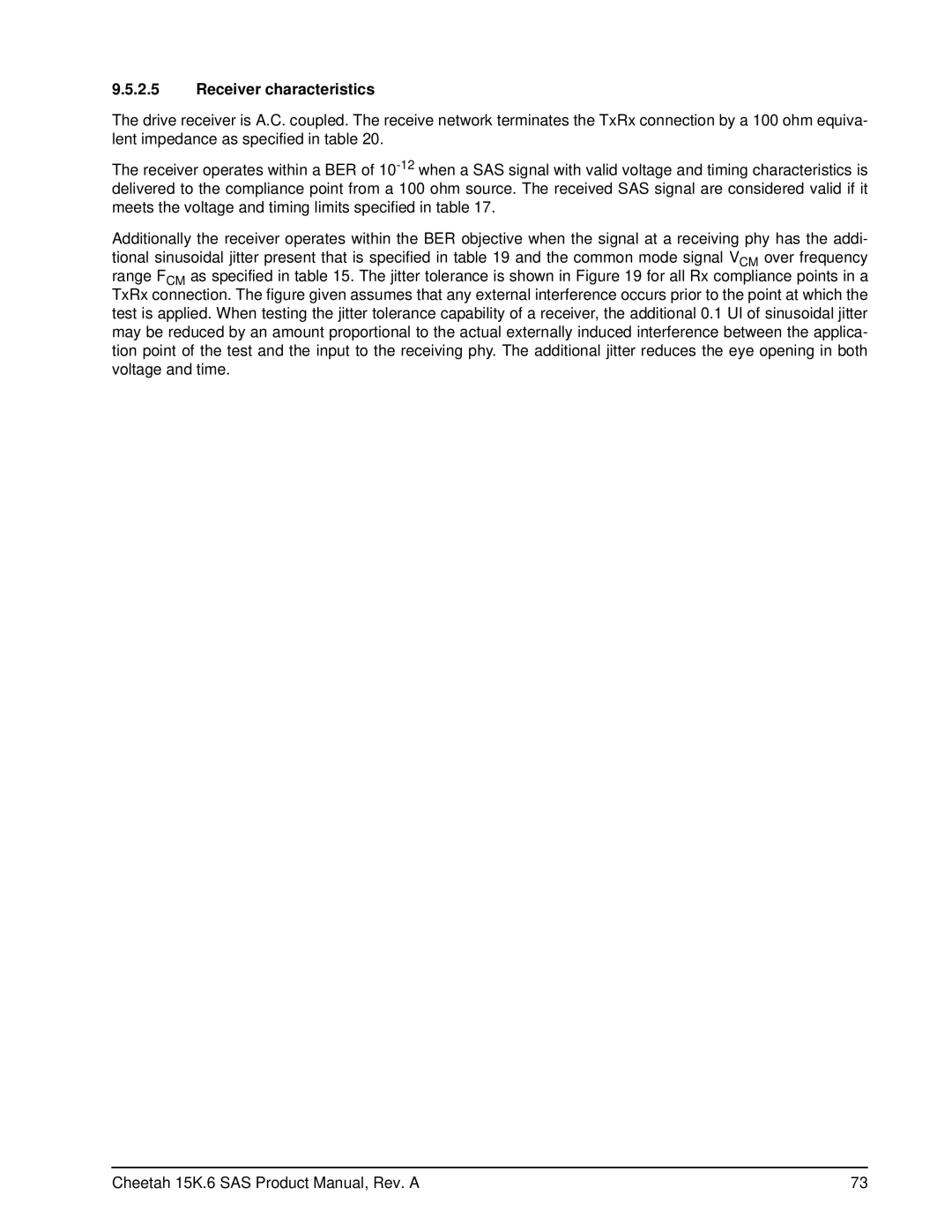ST3450856SS ST3300656SS ST3146356SS
Cheetah 15K.6 SAS
Page
Contents
Interface requirements
Defect and error management
Installation
Seagate Technology support services
Cheetah 15K.6 SAS disk drive
List of Figures
Cheetah 15K.6 SAS Product Manual, Rev. a
Cheetah 15K.6 SAS disk drive
Scope
Cheetah 15K.6 SAS Product Manual, Rev. a
Electromagnetic susceptibility
Standards, compliance and reference documents
Standards
Electromagnetic compatibility
European Union Restriction of Hazardous Substances RoHS
Compliance
Reference documents
Cheetah 15K.6 SAS Product Manual, Rev. a
General description
Media description
Standard features
Performance
Formatted capacities
Factory-installed accessories
Options factory installed
Reliability
Cheetah 15K.6 SAS Product Manual, Rev. a
Seek time
Performance characteristics
Internal drive characteristics
Access time
General performance characteristics
Format command execution time minutes
Start/stop time
Cache operation
Prefetch/multi-segmented cache control
Prefetch operation
Caching write data
Unrecoverable Errors
Reliability specifications
Error rates
Recoverable Errors
Preventive maintenance
Reliability and service
Seek errors
Interface errors
Milliseconds
4 S.M.A.R.T
Controlling S.M.A.R.T
Performance impact
Thermal monitor
Reporting control
Determining rate
Predictive failures
Parameter Code Description
Temperature Log Page 0Dh
Primary Temperature
Reference Temperature
Short test Function Code 001b
State of the drive prior to testing
Invoking DST
Short and extended tests
Product repair and return information
Product warranty
Abort
Shipping
Cheetah 15K.6 SAS Product Manual, Rev. a
ST3450856SS DC power requirements
Physical/electrical specifications
AC power requirements
DC power requirements
ST3146356SS Gbit mode Amps
ST3300656SS DC power requirements
ST3146356SS DC power requirements
ST3300656SS Gbit mode Amps
Current profiles
General DC power requirement notes
Power sequencing
Conducted noise immunity
Typical ST3450856SS current profiles
Typical ST3300656SS current profiles
Typical ST3146356SS current profiles
ST3450856SS in 3 Gbit operation
Power dissipation
ST3300656SS in 3 Gbit operation
ST3300656SS CURRENT/POWER vs Throughput SAS 3.0GB
ST3146356SS in 3 Gbit operation
ST3146356SS CURRENT/POWER vs Throughput SAS 3.0GB
Random 8 Block Reads
Environmental limits
Temperature
Shock
Relative humidity
Effective altitude sea level
Shock and vibration
Recommended mounting
Package size Packaged/product weight Drop height
Corrosive environment
Air cleanliness
Vibration
Acoustics
Mechanical specifications
Physical dimensions
Cheetah 15K.6 SAS Product Manual, Rev. a
Drive internal defects/errors
Defect and error management
Drive error recovery procedures
51.87
Background Media Scan
SAS system errors
Media Pre-Scan
Idle Read After Write
Deferred Auto-Reallocation
Drive orientation
Installation
Air flow
Cooling
Grounding
Drive mounting
Cheetah 15K.6 SAS Product Manual, Rev. a
Interface requirements
SAS features
Dual port support
Commands supported by Cheetah 15K.6 SAS family drives
Scsi commands supported
Command name Command code Supported
Commands supported by Cheetah 15K.6 SAS family drives
Commands supported by Cheetah 15K.6 SAS family drives
Commands supported by Cheetah 15K.6 SAS family drives
Inquiry data
Mode Sense data
Bytes Data hex
Page
Mode Pages
2.1 ST3450856SS Mode Sense data
2.2 ST3300656SS Mode Sense data
2.3 ST3146356SS Mode Sense data
Miscellaneous status
Miscellaneous operating features and conditions
Miscellaneous features
Supported Feature or condition
SAS physical interface
Datum B
Connector requirements
Physical characteristics
SAS pin descriptions
Pin Signal name Signal type
Electrical description
Pin descriptions
Ready LED Out
Signal characteristics
Power
SAS transmitters and receivers
Eye masks Eye masks overview
LED drive signal
Differential signals
General interface characteristics
Normalized time in UI
Receive eye mask
Jitter tolerance masks
Absolute amplitude
Frequency in kHz
Peak-to
Sinusoidal
Jitter
Signal characteristica Units Gbps
Transmitter signal characteristics
Gbps m, n Deterministic jitterq
Receiver signal characteristics
Signal characteristic Units Gbps
Maximum allowable jitter
Impedance requirements Sheet 1
Impedance specifications
Receiver jitter tolerance
Compliant jitter test pattern Cjtpat
Impedance requirements Sheet 2
Transmitter characteristics
Electrical TxRx connections
= -5,437dB
Shows the zero-length test load
Receiver characteristics
Cheetah 15K.6 SAS Product Manual, Rev. a
Technical Support
Seagate Technology support services
Internet
Presales Support
Data Recovery Services Authorized Service Centers
Warranty Service
Data Recovery Services Call Center Toll-free Direct dial
Numerics
Index
Page
SAS
See also cooling
